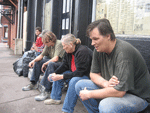SOCIAL WATCH E-NEWSLETTER - Issue 121 - March 8, 2013
Published on Fri, 2013-03-08 11:55
 |
| Issue 121 - March 8, 2013 |
|
|
|
| |
Canada: Living cutbacks

People waiting for a meal in New
Brunswick.(Photo: OldMaison.)
|
Canada’s economic policy continues to take reduction of the debt and deficit as its primary end. The means to this end include cuts to social infrastructure spending, public sector employment and the health and welfare institutions that used to put Canada near the top of most international measures of well-being.
Under cover of deficit reduction, the Government of Canada continues to withdraw funding from the civil society organizations and research institutions that measure the effectiveness of those government policies and provide alternatives to them. The impacts of those cuts are beginning to become evident as income inequality grows. On the international stage, Canada has championed austerity measures for countries facing economic crisis, Canadian foreign aid has been in decline while the Government's criticism of multi-lateral institutions for international cooperation increases.
If market conditions were ever to close the gap in Canada, this would have been the time. Social assistance rates have remained virtually unchanged across most of Canada. Most social assistance incomes in Canada remain well below the low income cut-off rate. The overall poverty rate in Canada is 9%, however, poverty rates continue to disproportionately affect women, Aboriginal peoples, and people with disabilities. For example, one in three Aboriginal and racialized people in Canada live in poverty. One in four people with disabilities, immigrants, and female single-parents in Canada live in poverty. Across all categories rates of poverty are higher for women than for men. Read more
|
| |
|
| |
Egypt: Two years of January 25th revolution

Demonstration at Tahrir Square, Cairo,
in January 2011. (Photo: EACPE)
|
Almost two years have passed since human rights and feminists organizations expressed their deep concern at the escalation of policies that reinforce impunity, do not protect citizens and do not guarantee the right of peaceful assembly. The exclusion of women from the public sphere through direct incitement and aggression must be condemned. The heinous crimes of sexual violence can not be separated from the decline of the social status of women.
The revolution of January 25, as the Egyptians call it, is the fourth in the last hundred and thirty years. The modern national movement has sought an effective national sovereignty, particularly with regard to economy and the ability to ensure socio-economic justice in the distribution of wealth and income. The Egyptian people discovered that without internal democracy it is impossible to preserve the conquests from previous revolutions. January 25 revolution asserts, then, the centrality of democracy, not only as a utopian goal, which practical implementation would be deferred indefinitely, but to lay the foundations of a modern, independent and prosperous country.
Read more
|
| |
|
| |
Korea: The government needs to improve social and gender policies

4-Rivers construction underway on the
Nakdong River (Photo: Lauren Stahl
internationalrivers.org)
|
Since the end of the Korean War in 1950, the country has achieved sustained economic growth. GDP, which at that time was US$ 67, doubled in a decade, between 2000 and 2010, Korea joined the OECD in 1996 and achieved most of the Millennium Development Goals (MDGs). But inequality, as a side effect of economic growth, is present. There is no more extreme poverty but diversified poverty, and society still has challenges that are not shown by the indicators. The government's economic policy has encouraged assembling industry export-oriented with cheap labor.
Between 2000 and 2009, relative poverty rates for children, seniors and women increased. Poverty is concentrated in the elderly at female level, low education, vulnerable health and in rural areas. It is clear that the government needs to implement policies to reduce socioeconomic inequality that go beyond reducing inequity and poverty, by creating quality jobs and social protection programs.
Read more
|
| |
|
| |
|
| |
Over sixty national Social Watch coalitions around the world are contributing their assessments and reports to the global Social Watch report 2013, under the overall theme of "Ends and Means." The Social Watch network thus joins the current global discussions around a set of Sustainable Development Goals and on a new development framework to be put in place when the MDGs expire in 2015.
The Social Watch national platforms are independent coalitions of civil society organizations struggling for social and gender justice in their own countries. The Social Watch network has been publishing since 1996 yearly reports on how governments implement their international commitments to eradicate poverty and achieve equality between women and men.
|
|
|
| |
|
SOCIAL WATCH IS AN INTERNATIONAL NGO WATCHDOG NETWORK MONITORING POVERTY ERADICATION AND GENDER EQUALITY Social Watch >>
Social Watch E-Newsletter For comments, sugestions, collaborations contact us at: socwatch@socialwatch.orgTo stop receiving this newsletter send a message with the subject "unsubscribe" to: socwatch@socialwatch.org |
| Made possible thanks to the funding and support of Oxfam Novib and the Flemish North South Movement - 11.11.11. |
 |
| The contents of this publication are the sole responsibility of Social Watch and can in no way be taken to reflect the views of Oxfam Novib and the Coalition of the Flemish North South Movement - 11.11.11. |
|
|
|
SUSCRIBE TO OUR NEWSLETTER
Submit
|
